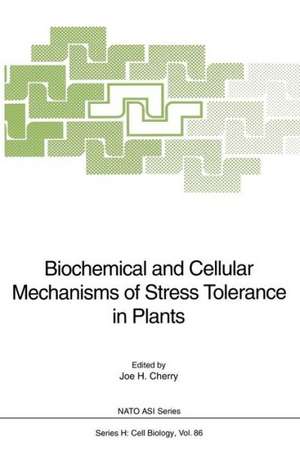Biochemical and Cellular Mechanisms of Stress Tolerance in Plants: Nato ASI Subseries H:, cartea 86
Editat de Joe H. Cherryen Limba Engleză Paperback – 22 noi 2011
Din seria Nato ASI Subseries H:
- 18%
 Preț: 953.82 lei
Preț: 953.82 lei -
 Preț: 393.13 lei
Preț: 393.13 lei - 15%
 Preț: 643.34 lei
Preț: 643.34 lei - 15%
 Preț: 643.34 lei
Preț: 643.34 lei - 15%
 Preț: 641.03 lei
Preț: 641.03 lei - 15%
 Preț: 642.83 lei
Preț: 642.83 lei - 15%
 Preț: 642.51 lei
Preț: 642.51 lei - 5%
 Preț: 712.81 lei
Preț: 712.81 lei -
 Preț: 392.97 lei
Preț: 392.97 lei - 15%
 Preț: 651.02 lei
Preț: 651.02 lei - 15%
 Preț: 640.24 lei
Preț: 640.24 lei - 18%
 Preț: 948.61 lei
Preț: 948.61 lei - 15%
 Preț: 655.92 lei
Preț: 655.92 lei - 15%
 Preț: 655.92 lei
Preț: 655.92 lei - 15%
 Preț: 653.14 lei
Preț: 653.14 lei - 15%
 Preț: 650.19 lei
Preț: 650.19 lei - 15%
 Preț: 655.13 lei
Preț: 655.13 lei - 15%
 Preț: 652.17 lei
Preț: 652.17 lei - 15%
 Preț: 675.58 lei
Preț: 675.58 lei - 18%
 Preț: 958.07 lei
Preț: 958.07 lei - 18%
 Preț: 961.41 lei
Preț: 961.41 lei - 18%
 Preț: 970.56 lei
Preț: 970.56 lei - 5%
 Preț: 1100.30 lei
Preț: 1100.30 lei - 5%
 Preț: 376.43 lei
Preț: 376.43 lei - 15%
 Preț: 650.86 lei
Preț: 650.86 lei - 15%
 Preț: 644.63 lei
Preț: 644.63 lei - 15%
 Preț: 655.60 lei
Preț: 655.60 lei - 18%
 Preț: 963.47 lei
Preț: 963.47 lei - 15%
 Preț: 648.42 lei
Preț: 648.42 lei - 5%
 Preț: 731.43 lei
Preț: 731.43 lei - 15%
 Preț: 653.14 lei
Preț: 653.14 lei - 18%
 Preț: 960.13 lei
Preț: 960.13 lei - 18%
 Preț: 968.34 lei
Preț: 968.34 lei - 18%
 Preț: 953.97 lei
Preț: 953.97 lei - 15%
 Preț: 654.95 lei
Preț: 654.95 lei - 15%
 Preț: 652.49 lei
Preț: 652.49 lei - 15%
 Preț: 650.86 lei
Preț: 650.86 lei - 5%
 Preț: 367.64 lei
Preț: 367.64 lei - 5%
 Preț: 1104.68 lei
Preț: 1104.68 lei - 18%
 Preț: 953.20 lei
Preț: 953.20 lei - 15%
 Preț: 651.99 lei
Preț: 651.99 lei - 15%
 Preț: 647.27 lei
Preț: 647.27 lei - 15%
 Preț: 653.00 lei
Preț: 653.00 lei - 15%
 Preț: 656.25 lei
Preț: 656.25 lei - 18%
 Preț: 962.35 lei
Preț: 962.35 lei - 15%
 Preț: 644.82 lei
Preț: 644.82 lei - 15%
 Preț: 666.55 lei
Preț: 666.55 lei - 15%
 Preț: 642.68 lei
Preț: 642.68 lei - 15%
 Preț: 645.96 lei
Preț: 645.96 lei - 15%
 Preț: 651.84 lei
Preț: 651.84 lei
Preț: 656.58 lei
Preț vechi: 772.44 lei
-15% Nou
Puncte Express: 985
Preț estimativ în valută:
125.68€ • 136.56$ • 105.64£
125.68€ • 136.56$ • 105.64£
Carte tipărită la comandă
Livrare economică 21 aprilie-05 mai
Preluare comenzi: 021 569.72.76
Specificații
ISBN-13: 9783642791352
ISBN-10: 3642791352
Pagini: 628
Ilustrații: XII, 604 p.
Dimensiuni: 155 x 235 x 33 mm
Greutate: 0.87 kg
Ediția:Softcover reprint of the original 1st ed. 1994
Editura: Springer Berlin, Heidelberg
Colecția Springer
Seria Nato ASI Subseries H:
Locul publicării:Berlin, Heidelberg, Germany
ISBN-10: 3642791352
Pagini: 628
Ilustrații: XII, 604 p.
Dimensiuni: 155 x 235 x 33 mm
Greutate: 0.87 kg
Ediția:Softcover reprint of the original 1st ed. 1994
Editura: Springer Berlin, Heidelberg
Colecția Springer
Seria Nato ASI Subseries H:
Locul publicării:Berlin, Heidelberg, Germany
Public țintă
ResearchCuprins
1 High Temperature Stress.- The heat stress response as part of the plant stress network: An overview with six tables.- Developmental regulation and enhancement of heat shock gene expression.- Normal cellular protein synthesis and heat shock.- Thermal acclimation and heat stress response of synechocystis PCC6803: The possible role of thylakoid physical state, lipid saturation and molecular chaperones.- Studies of a chloroplast-localized small heat shock protein in arabidopsis.- The low molecular weight heat shock proteins of soybean seedlings.- Class I low molecular weight heat shock proteins in plants: immunological study and thermoprotection against heat denaturation of soluble proteins.- Genetic and molecular evidences of the regulation of gene expression during heat shock in plants.- Integration of acquired thermotolerance within the developmental program of seed reserve mobilization.- Cross protection of one stress by another: strategies in postharvest fruit storage.- Photosynthesis, epicuticular wax and lipid changes in cowpea cultivars grown under hyperthermic conditions.- Altered gene expression in thermoadapted cultured cells of cowpea.- 2 Drought Stress.- Cloning of a DNA fragment encoding ?-glutamyl kinase and ?-glutamyl phosphate reductase from a tomato cDNA library.- Regulation of gene expression in response to drought and osmotic shock.- Gene expression during water stress.- Molecular genetic approaches to improving heat and drought stress tolerance in crop plants.- Evolution and metabolic engineering of osmoprotectant accumulation in higher plants.- Regulation of shoot growth in dry soils by abscisic acid and by root messages.- Stress tolerance in plants: What are we looking for?.- Proteolysis and proteolytic activities in the acclimation to stress: thecase of sugar starvation in maize root tips.- Regulation of the rab17 gene in ABA-deficient and ABA-insensitive viviparous mutants of maize.- A role for sorbitol in desiccation tolerance of developing maize kernels: inference from the properties of maize sorbitol dehydrogenase.- 3 Salinity Stress.- Yeast halotolerance genes: crucial ion transport and metabolic reactions in salt tolerance.- Structure, regulation and function of the osmotin gene.- Responses to salt stress in the halophyte mesembryanthemum crystallinum.- Alterations in H+-ATPase gene expression in response to salt.- Solute regulation by calcium in salt-stressed plants.- The response of plants to salinity: a working hypothesis.- 4 Low Temperature Stress.- Caps, cors, dehydrins, and molecular chaperones: their relationship with low temperature responses in spinach.- Low temperature signal transduction, gene expression, and cold acclimation: multiple roles of low temperature.- Molecular analysis of cold-hardening in barley.- Regulation of low temperature-induced genes during cold acclimation of arabidopsis thaliana.- Genetically engineered modification of plant chilling sensitivity and characterization of cyanobacterial heat shock proteins.- Low temperature regulation of gene expression in winter Brassica napus.- Sorting genes controlling freezing stress resistance: strategy for moving desired traits by merging physiological and genetic approaches.- 5 Engineering Plants for Stress Tolerance.- Engineering plants for stress tolerance via organelle genomes.
















